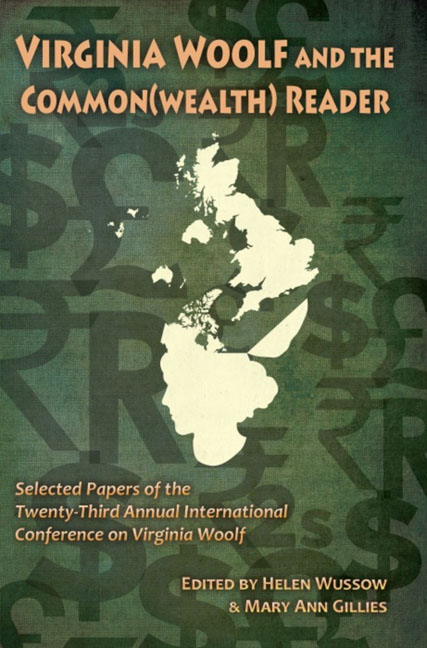Book contents
- Frontmatter
- Contents
- Introduction to Virginia Woolf and the Common(wealth) Reader
- Acknowledgments
- List of Abbreviations
- Invocations
- Networks of Affiliation: Foundations and Friends
- Woolf and the Commonwealth
- 1930s Onwards
- War, Peace, Internationalism: Bloomsbury Legacies
- “Caterpillars of the Commonwealth Unite”: Photography and Trauma in Three Guineas
- “Drawn from Our Island History”: Virginia Woolf, Nancy Mitford, and the Politics of Pageantry
- A ”Bloodless and Pernicious Pest”: The Middlebrow's “Common Man” in the Essays of Virginia Woolf
- Woolf's Troubled and Troubling Relationship to Race: The Long Reach of the White Arm of Imperialism
- Woolfian Seamarks: Commodified Women and the Racial Other on the Shores of Empire
- Documenting Fascism in Three Guineas and The Handmaid's Tale: An Examination of Woolf's Textual Notes and Scrapbooks and Atwood's “Historical Notes”
- Proportion, Conversion, Transition: War Trauma and Sites of Healing in Virginia Woolf's Mrs. Dalloway and Leslie Marmon Silko's Ceremony
- Woolf Beyond the Book
- Notes on Contributors
- Conference Program
“Caterpillars of the Commonwealth Unite”: Photography and Trauma in Three Guineas
from 1930s Onwards
- Frontmatter
- Contents
- Introduction to Virginia Woolf and the Common(wealth) Reader
- Acknowledgments
- List of Abbreviations
- Invocations
- Networks of Affiliation: Foundations and Friends
- Woolf and the Commonwealth
- 1930s Onwards
- War, Peace, Internationalism: Bloomsbury Legacies
- “Caterpillars of the Commonwealth Unite”: Photography and Trauma in Three Guineas
- “Drawn from Our Island History”: Virginia Woolf, Nancy Mitford, and the Politics of Pageantry
- A ”Bloodless and Pernicious Pest”: The Middlebrow's “Common Man” in the Essays of Virginia Woolf
- Woolf's Troubled and Troubling Relationship to Race: The Long Reach of the White Arm of Imperialism
- Woolfian Seamarks: Commodified Women and the Racial Other on the Shores of Empire
- Documenting Fascism in Three Guineas and The Handmaid's Tale: An Examination of Woolf's Textual Notes and Scrapbooks and Atwood's “Historical Notes”
- Proportion, Conversion, Transition: War Trauma and Sites of Healing in Virginia Woolf's Mrs. Dalloway and Leslie Marmon Silko's Ceremony
- Woolf Beyond the Book
- Notes on Contributors
- Conference Program
Summary
Trauma is a disorder of memory and time.
—(Baer 9)Q.D. Leavis opens her 1938 review of Three Guineas, “Caterpillars of the Commonwealth Unite,” by declaring that the book is not “really reviewable” (204). The reason? The work is merely a conversation between Woolf and her social class, limiting men to functioning only “at Westminster,” while women do no more than shop (204). Mrs. Woolf, Leavis claims, is not living in the contemporary world. In fact, her class only succeeds in insulating her, although Woolf has benefited from that isolation. But to complain of the rights of women is almost ludicrous given Woolf's advantages. Furthermore, “this book is not mere silly and ill-informed, though it is that too, it contains some dangerous assumptions, some preposterous claims and some nasty attitudes” (Leavis 204). Using “feminine inconsequence” as a weapon is hardly an argument; the impact, Leavis caustically writes, is “like Nazi dialectic without Nazi conviction” (204). Woolf, it seems, wants the women of her class “to have the privileges of womanhood without the duties and responsibilities” (210). She adds that the photographs in the book of men dressed for power have been “selected with malice;” a set of women equally dressed could easily be compiled (210). The photographs defeat themselves.
The telling photographs in Three Guineas Leavis does not mention, however, are the ones that are not there, those of the unidentified civilians killed in the Spanish Civil War described but not reproduced in the text. They function to register trauma, echoing Freud who applied the metaphor of the camera to explain the unconscious as the place where often traumatic memory-bits remain seized until resolved (Baer 9). But rather than capturing past time, photographs of traumatic events access time and action that are distinct and explosive but not yet integrated into consciousness. They register in the psyche, as do the photographs of the dead for Woolf. The photograph is not a narrative but the embodiment of trauma itself, time as a single devastating burst of unprocessed knowledge. The photograph's capture of “unexperienced events” parallels the structure of traumatic memory (Baer 8).
- Type
- Chapter
- Information
- Virginia Woolf and the Common(wealth) Reader , pp. 145 - 150Publisher: Liverpool University PressPrint publication year: 2014



